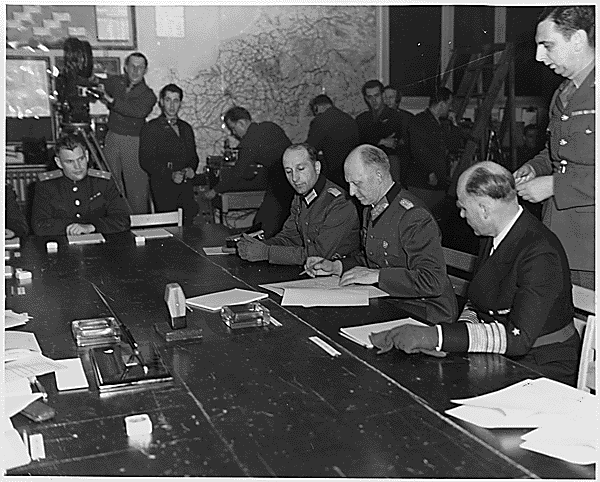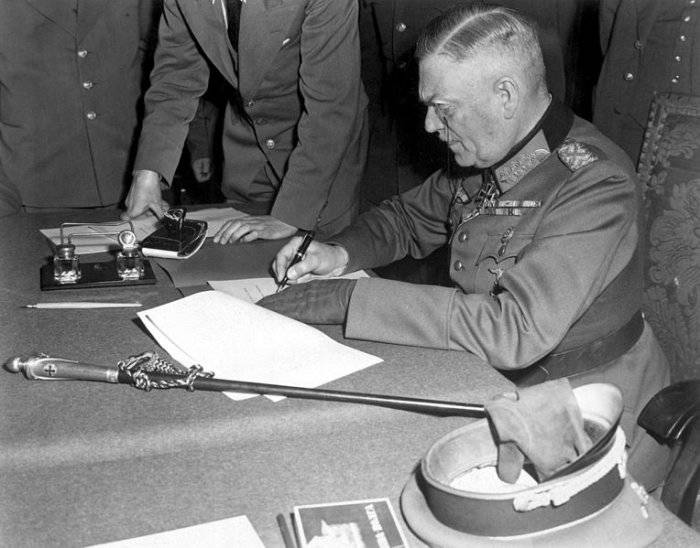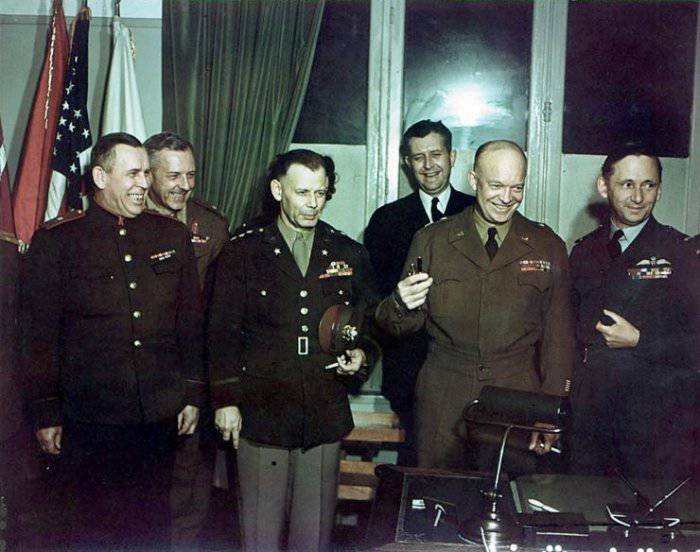As we tried to "borrow" Victory ...
As early as April 1945, Goering proposed to Montgomery (English field marshal) "to deploy the entire Western Front and throw the Russians out of the territory of the Reich." There were other proposals - in March-April, negotiations were conducted with Himmler, the elite of the Reich sought to prevent the complete Victory of the USSR, and the "allies" of the Union were not averse to "borrow" the victory. In the last few days there was a struggle, 23 April Goering told Hitler about the desire to take the supreme power, from the beginning Hitler accepted this news indifferently: "Spit. If the war is lost, the German people must die. Let him do what he wants." But then, driven by Borman, who did not want to cede power to his rival, he ordered Goering to be arrested, giving him a capacious description: "Bribe taker, morphine, and ... generally a corrupt creature."
30 April, Hitler committed suicide, his "heirs" were to become: Reich Chancellor - Goebbels (although he also committed suicide), Party Minister - Bormann, Reich President - Grand Admiral Karl Denitz. Dönitz was with his headquarters in the north, in Flensburg, he said: "Enough blood, enough valiant battles, you need to save people, rather meaningless victims." But he did not want to capitulate to the Red Army, but wanted to sign an agreement with the Western powers. The headquarters planned to fight another ten days to bring as many units of the Wehrmacht to the West as possible. For a week, the Germans were able to evacuate to the west to 3 million soldiers and refugees.
4 May B. Montgomery, violating the agreement between the allies of the anti-Hitler coalition (only all powers could sign the surrender together), signed a document on the “purely military” surrender of German troops in northwestern Germany, Denmark and the Netherlands. The truce entered into force on 8.00 5 May.
The commander-in-chief of the Allied forces on the Western Front, D. Eisenhower, rejected the German side’s proposal for partial surrender, demanding the signing of a capitulation with all three great powers. On May 6, he invited the head of our military mission at the headquarters of the US Armed Forces General I. A. Susloparov to his office. Eisenhower announced the arrival of General Jodl with a proposal to capitulate to the Anglo-American troops, and then offered to attack the Red Army together. Eisenhower said that, of course, his proposal was rejected and demanded a full surrender and that it was necessary to sign it. Time Americans assigned to 2.30 am 7 May, Susloparov was asked to inform Moscow and sign the document.
There was no response from Moscow, and Susloparov decided to sign a surrender (they answered in Moscow not to sign). In 2.41, another capitulation was signed, it was signed: from Germany’s side, Jodl, from the west side, General Beddel Smith, from the Soviet Union, Major General Susloparov. The capitulation entered into force on 23.01 8 May. This day was the Victory Day in Europe. True, Susloparov noted that it was possible to sign a better document, “if any federal government declares that”.

Colonel-General Alfred Jodl signs the Surrender Act of Reims.
Ivan Alexeevich Susloparov (far left) after the signing of the “Preliminary Protocol on the surrender of Germany”.
At the same time, the USA and Great Britain “bombarded” the Kremlin with requests to declare the surrender of the Third Reich to the world, proposing time and appointing a new one. Everyone wanted to put a “winner’s wreath” on his head. But Stalin showed an iron temper, he said that surrender in Reims cannot be accepted, but it cannot be rejected. Surrender is crucial historical event, and it should be signed in Berlin, with the presence of the supreme command of all the allied countries. On our part, it was decided that G.K. Zhukov would sign it. On the evening of May 7, when the victory was celebrated in Paris, London, New York, in Moscow at the Bolshoi Theater, where the heads of embassies were invited (they thought they would announce victory in Moscow), a concert was held in honor of the 40th anniversary of the death of inventor A S. Popova.
On May 9 at 00:16 CET and at 02:16 Moscow time in Berlin, on the outskirts of Karlshorst, the final surrender of the Reich was signed. The ceremony was opened by G.K. Zhukov, from the German side the Act was signed by Field Marshal Wilhelm Keitel and Colonel General Stumpf (representative of the Luftwaffe), Admiral von Friedeburg (from fleet), surrender was accepted by Marshal Zhukov and deputy commander of the allied expeditionary forces Tedder. In the USSR, they learned about this at 10 pm Moscow time from a message from the Soviet Information Bureau, the announcer was Yu.B. Levitan. The USSR and the Western powers agreed that the surrender in Reims was preliminary. Western historiography is currently linking the surrender of the Third Reich to the signing of the document in Reims, and the act in Berlin is called "ratification."
The peace treaty with Germany was approved only on January 25, 1955, when it was signed by the Presidium of the Supreme Soviet of the USSR.
Sources of:
Lavrenov S. Ya. Popov I. M. The collapse of the Third Reich. M., 2000.
Montgomery B. Memoirs of Field Marshal. M., 2006.
Shtemenko S.M. General Staff during the war. M., 1989.


Information